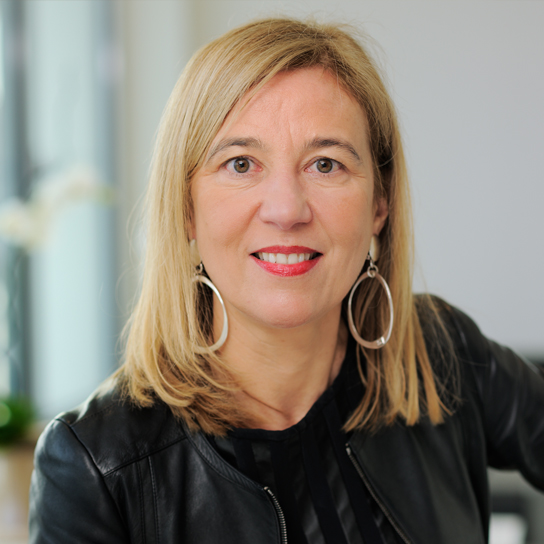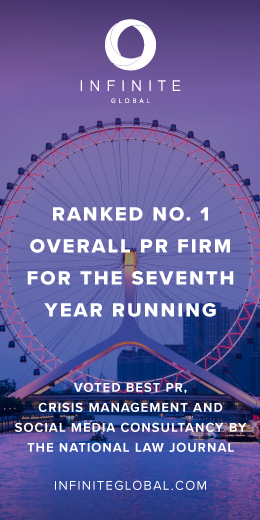“Where there is an opportunity to develop, to learn, I’m happy to do that.”
This simple statement by Marie-Aimée de Dampierre seems to go a long way in explaining her success, which includes her recent appointment as Hogan Lovells’ first female and Paris-based chair.
The WILEF Tribune recently spoke on a Zoom call with de Dampierre, who recounted the many professional opportunities that have come her way throughout her 20-year career at the firm—and the many she happily said yes to. The most recent—the chance to be appointed global chair—opened shortly after she had been appointed as Regional Managing Partner – EMEA in July 2020 (at the time, she was already Regional Managing partner for Continental Europe). After receiving encouragement from several partners, de Dampierre decided to put her name in the ring.
“To be honest, I wasn’t at all thinking of becoming chair. I had just agreed to this new position. But I said to myself, ‘After all, you try. If it doesn’t work, okay, it doesn’t work.”
An edited version of the rest of the conversation follows below.
When you joined Hogan Lovells in 2001, did you ever think you would be in firm leadership?
No. The time was different. I was coming from a boutique firm that I liked a lot and was starting to open up to women. But I believe that Hogan Lovells has given me so many opportunities and so much support.
I will always remember our former managing partner, who was one of my mentors, asking me when I interviewed at the firm about 20 years ago, “What would you favor, professional or personal life?” And I thought, “How am I going to respond?” And I said, “Both.” He said, “You’re right.” He also noted that our managing partner globally was a woman and had four children. So, it was reassuring.
And I can tell you because so many women are now in leadership positions, we want to focus even more on gender diversity. Susan Bright has recently been nominated as the Global Managing Partner for Diversity & Inclusion and Responsible Business, and she now reports directly to the CEO. So, it means something.
You are among a group of women recently appointed to lead large law firms, but it’s still rare to see. Why aren’t there more women leading major law firms?
First of all, there is this tradition and history of a profession led by white men, and you have to make your own way. There used to be few opportunities because men were not open to that, and some women were not pushing enough.
At the same time, some of us were not as assured, and we sometimes underestimated ourselves. I am more convinced than ever that we need to control our destiny and decide what we want to do.
But sometimes, you need help. I’m not sure I would have decided by myself to take on leadership roles without support. Today we have more support programs. It is important to have ongoing discussions, identify talented women suited for leadership, and help them grow and develop.
How will diversity, equity, and inclusion play into your new role?
It will play an important role. D&I is one of the pillars of the International Management Committee (“IMC”) strategy. I am the IMC member working closely with Susan Bright on it. Susan and I have already agreed that as of May 1rst, we will continue to catch’ up regularly, since culture is one of the key focuses of the Chair and of the Board members, and D&I is a part of our culture.
I consider that Hogan Lovells is well-positioned when it comes to gender diversity and we are known for that but we still have progress to make; the firm is committed to D&I and you will see those progress.
It is said that it takes five years to change a culture or to change the mindset on D&I. I fully agree. That’s not something you can impose. D&I has to be fully embedded in our culture, our teams must be convinced and embrace changes. The good thing is that our clients are pushing in that direction and so are younger people in our firm, and we want to remain an attractive firm for them!
Have you established your broader goals?
Before coming to a more refined plan, I want to have one-to-one meetings with each board member. Even though I already have a good understanding of what’s going on in the firm, I want to reach all partners, including in Asia and all the Americas, before May 1st.
While getting out of the pandemic, we will need to make sure that we set the scene right. Making sure that our teams connect or reconnect, that there is cohesion; understanding why working at Hogan Lovells makes sense, and confirming our commitment to the firm, the sense of ownership, and shared ambition. You know how important culture is to me as is communication. All of this, again, is about our values and our culture. The IMC is exactly right when it focuses on profitability, clients, improving performance. But you will not succeed if you don’t have a strong culture and if you don’t have a diverse team.
How do you characterize the challenges that the pandemic has imposed on women lawyers? Obviously, there are challenges, but have there been any positive effects?
The challenges were everywhere—women having to take care of their homes, no possibility of having anyone helping them, either with childcare or for cleaning the house.. . Or living in very small places with small children, exhausted at the end of the day. So that has been very difficult.
At the same time, we had time to focus and to think about what to do better. After George Floyd’s dramatic death, we have taken very practical steps to work and support advancing racial justice. We have set higher targets in terms of the number of hours to spend on D&I and responsible business. We have insisted that we want to have diverse people working on the most visible deals and cases, and we have communicated that internally and with clients.
We also learned that remote working can be successful. We now have a better understanding of one another and the demands on our time. Today, women—and men—feel more empowered to request agile working arrangements.
Who have been your mentors or some people you look up to?
At different steps of my career, there have been different people who were supportive and trusted me —including [former Hogan Lovells CEO] Steve Immelt and then [current CEO] Miguel Zaldivar.. And when I look outside the firm, I see women in Paris who have been successful: Christine Lagarde is certainly one of them. Today it’s the first time you see a generation of women managing partners succeeding.
What would you be doing if you were not a lawyer?
I would be an entrepreneur. I would have a place where people can come together, spend time having a coffee, a light meal, working, educating, helping each other. For me, it’s about finding a way of giving back to society. I don’t have the details, but I would like to have a place where people feel welcome and can progress and develop.
Where do you see yourself in 10 years?
Maybe just retired. But that’s not the end. That’s because I want to have another life. I think I will be young enough to do all the things I want to do. I have not decided yet. It might travel. I might be volunteering. My concern is that I need three lives. One is not enough for all that I want to do!



